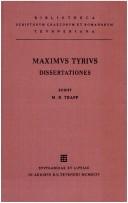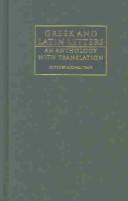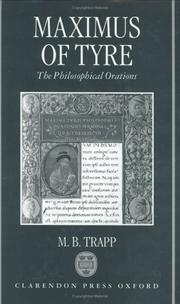| Listing 1 - 10 of 11 | << page >> |
Sort by
|

ISSN: 02331160 ISBN: 3815415357 3598715358 311095561X 9783110955613 9783598715358 9783815415351 Year: 1994 Volume: *356 Publisher: Stutgardiae B.G. Teubner
Abstract | Keywords | Export | Availability | Bookmark
 Loading...
Loading...Choose an application
- Reference Manager
- EndNote
- RefWorks (Direct export to RefWorks)
Maximus Tyrius: Dissertationes (Bibliotheca Teubneriana)
Classical Greek literature --- Philosophy, Ancient --- Philosophie ancienne --- Philosophy, Ancient. --- Ancient philosophy --- Greek philosophy --- Philosophy, Greek --- Philosophy, Roman --- Roman philosophy

ISBN: 0521495970 0521499437 9780521499439 9780521495974 Year: 2003 Volume: *4 Publisher: Cambridge : Cambridge University Press,
Abstract | Keywords | Export | Availability | Bookmark
 Loading...
Loading...Choose an application
- Reference Manager
- EndNote
- RefWorks (Direct export to RefWorks)
"The 78 letters in this Anthology (41 Greek, 36 Latin and 1 bilingual, with facing English translation) are selected both for their intrinsic interest, and to illustrate the range of functions letters performed in the ancient world. Dating from between c. 500 BC and c. 400 AD, they include naive and high-style, 'real' and 'fictitious', and classical and patristic items: Cicero, Horace, Ovid, Seneca, Pliny, Julian, Basil and Augustine are juxtaposed with Phalaris, Diogenes, Chion, and the authors of letters on lead, wood, papyrus and stone. Four final items exemplify ancient epistolary theory. The Commentary, besides providing contextual and linguistic assistance, draws attention to specifically epistolary features and to different stylistic levels of Greek and Latin represented. Epistolary topics and formulae are discussed in the Introduction, which also provides biographical and bibliographical information on all texts and authors included, and a history of letter-writing and letter-reading in antiquity."--Jacket.
Brieven [Griekse en Latijnse ] --- Brieven [Klassieke ] --- Brieven [Latijnse en Griekse ] --- Classical letters --- Griekse en Latijnse brieven --- Klassieke brieven --- Latijnse en Griekse brieven --- Letters [Classical ] --- Lettres (Genre littéraire) classiques --- Lettres (Genre littéraire) grecques et latines --- Lettres (Genre littéraire) latines et grecques --- Lettres (Genre littéraire) anciennes --- Classical letters. --- Lettres (Genre littéraire) anciennes --- Classical literature

ISBN: 0198149891 9780198149897 Year: 1997 Publisher: Oxford Clarendon
Abstract | Keywords | Export | Availability | Bookmark
 Loading...
Loading...Choose an application
- Reference Manager
- EndNote
- RefWorks (Direct export to RefWorks)
Philosophy, Ancient. --- Philosophy, Ancient --- Ancient philosophy --- Greek philosophy --- Philosophy, Greek --- Philosophy, Roman --- Roman philosophy
Article
Abstract | Keywords | Export | Availability | Bookmark
 Loading...
Loading...Choose an application
- Reference Manager
- EndNote
- RefWorks (Direct export to RefWorks)

ISBN: 3815415357 Year: 1994 Publisher: Stuttgart Teubner
Abstract | Keywords | Export | Availability | Bookmark
 Loading...
Loading...Choose an application
- Reference Manager
- EndNote
- RefWorks (Direct export to RefWorks)
Book
Year: 2021 Publisher: Cambridge, Massachusetts : Harvard University Press,
Abstract | Keywords | Export | Availability | Bookmark
 Loading...
Loading...Choose an application
- Reference Manager
- EndNote
- RefWorks (Direct export to RefWorks)
"Publius Aelius Aristides Theodorus was among the most celebrated authors of the Second Sophistic and an important figure in the transmission of Hellenism. Born to wealthy landowners in Mysia in 117, he studied in Athens and Pergamum before he fell chronically ill in the early 140s and retreated to Pergamum's healing shrine of Asclepius. By 147 Aristides was able to resume his public activities and pursue a successful oratorical career. Based at his family estate in Smyrna, he traveled between bouts of illness and produced speeches and lectures, declamations on historical themes, polemical works, prose hymns, and various essays, all of it displaying deep and creative familiarity with the classical literary heritage. He died between 180 and 185. This edition of Aristides, new to the Loeb Classical Library, offers fresh translations and texts based on the critical editions of Lenz-Behr (Orations 1-16) and Keil (Orations 17-53)."--Provided by publisher.
Book
Year: 2021 Publisher: Cambridge, Massachusetts : Harvard University Press,
Abstract | Keywords | Export | Availability | Bookmark
 Loading...
Loading...Choose an application
- Reference Manager
- EndNote
- RefWorks (Direct export to RefWorks)
"Publius Aelius Aristides Theodorus was among the most celebrated authors of the Second Sophistic and an important figure in the transmission of Hellenism. Born to wealthy landowners in Mysia in 117, he studied in Athens and Pergamum before he fell chronically ill in the early 140s and retreated to Pergamum's healing shrine of Asclepius. By 147 Aristides was able to resume his public activities and pursue a successful oratorical career. Based at his family estate in Smyrna, he traveled between bouts of illness and produced speeches and lectures, declamations on historical themes, polemical works, prose hymns, and various essays, all of it displaying deep and creative familiarity with the classical literary heritage. He died between 180 and 185. This edition of Aristides, new to the Loeb Classical Library, offers fresh translations and texts based on the critical editions of Lenz-Behr (Orations 1-16) and Keil (Orations 17-53)."--Provided by publisher.
Book
ISBN: 9780674996465 0674996461 9780674997363 0674997360 Year: 2017 Volume: 533, 545 1, 2 Publisher: Harvard University Press
Abstract | Keywords | Export | Availability | Bookmark
 Loading...
Loading...Choose an application
- Reference Manager
- EndNote
- RefWorks (Direct export to RefWorks)
"Publius Aelius Aristides Theodorus was among the most celebrated authors of the Second Sophistic and an important figure in the transmission of Hellenism. Born to wealthy landowners in Mysia in 117, he studied in Athens and Pergamum before he fell chronically ill in the early 140s and retreated to Pergamum's healing shrine of Asclepius. By 147 Aristides was able to resume his public activities and pursue a successful oratorical career. Based at his family estate in Smyrna, he traveled between bouts of illness and produced speeches and lectures, declamations on historical themes, polemical works, prose hymns, and various essays, all of it displaying deep and creative familiarity with the classical literary heritage. He died between 180 and 185. This edition of Aristides, new to the Loeb Classical Library, offers fresh translations and texts based on the critical editions of Lenz-Behr (Orations 1-16) and Keil (Orations 17-53). Volume I contains the Panathenaic Oration, a historical appreciation of classical Athens and Aristides' most influential work, and A Reply to Plato, the first of three essays taking issue with the attack on orators and oratory delivered in Plato's Gorgias." -- Publisher's description.
Book

Year: 2014 Publisher: Publicacions i Edicions de la Universitat de Barcelona
Abstract | Keywords | Export | Availability | Bookmark
 Loading...
Loading...Choose an application
- Reference Manager
- EndNote
- RefWorks (Direct export to RefWorks)
The underlying theme of Three Centuries of Greek Culture under the Roman Empire is the idea that, under Roman rule, Greek culture was still alive and dynamic and continued to exert a degree of cultural domination, either real or apparent. So, we hope to analyse the meanings of concepts such as “Greek” or “Greece” in the Empire. Are we right to assume that there was a clear opposition between Greek and Roman? Or would it be more accurate to speak of a “Graeco-Roman world”? It would certainly be possible to make a list of “elements of identity”, on both sides —Greek and Roman—, but, in this case, where should the borders between identity and community be placed? Three Centuries of Greek Culture under the Roman Empire presents several approaches to the period between the second and fourth centuries AD from a variety of angles, perspectives and disciplines. Until now, this time has usually been considered to be the junction of the decline between the classical world and the emergence of the medieval world; however, this book establishes a basis for considering the Imperial period as a specific stage in cultural, historical and social development with a distinct personality of its own.
Literature & literary studies --- History --- Etnicitat --- Literatura grega --- Imperi Romà, 284-476 --- Grècia --- Segle II-segle IV
Book

Year: 2014 Publisher: Publicacions i Edicions de la Universitat de Barcelona
Abstract | Keywords | Export | Availability | Bookmark
 Loading...
Loading...Choose an application
- Reference Manager
- EndNote
- RefWorks (Direct export to RefWorks)
The underlying theme of Three Centuries of Greek Culture under the Roman Empire is the idea that, under Roman rule, Greek culture was still alive and dynamic and continued to exert a degree of cultural domination, either real or apparent. So, we hope to analyse the meanings of concepts such as “Greek” or “Greece” in the Empire. Are we right to assume that there was a clear opposition between Greek and Roman? Or would it be more accurate to speak of a “Graeco-Roman world”? It would certainly be possible to make a list of “elements of identity”, on both sides —Greek and Roman—, but, in this case, where should the borders between identity and community be placed? Three Centuries of Greek Culture under the Roman Empire presents several approaches to the period between the second and fourth centuries AD from a variety of angles, perspectives and disciplines. Until now, this time has usually been considered to be the junction of the decline between the classical world and the emergence of the medieval world; however, this book establishes a basis for considering the Imperial period as a specific stage in cultural, historical and social development with a distinct personality of its own.
Literature & literary studies --- History --- Etnicitat --- Literatura grega --- Imperi Romà, 284-476 --- Grècia --- Segle II-segle IV
| Listing 1 - 10 of 11 | << page >> |
Sort by
|

 Search
Search Feedback
Feedback About
About Help
Help News
News